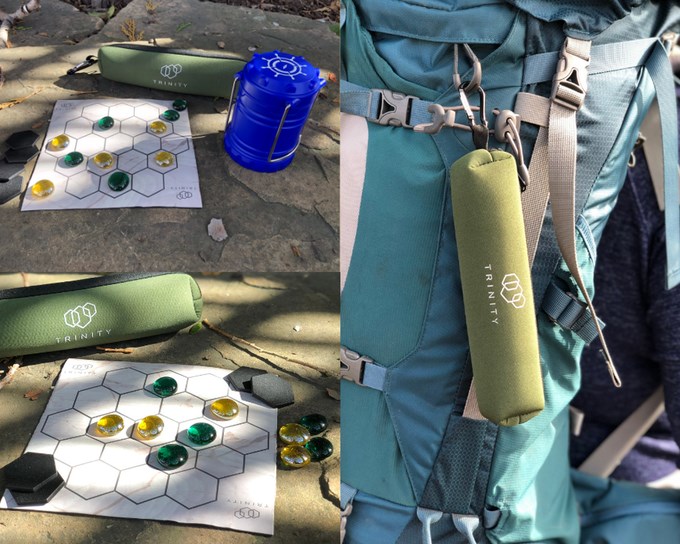I have to say out of the mail wrapping I was immediately impressed by the packaging for the new game Trinity.
It comes in a zippered pouch about the size of a hotdog bun, complete with a small mountaineering snap ring so you can fasten it to a belt loop, or on a pack and take the game anywhere.
Inside is more simple goodness. The board is made of mousepad material, so rolls up neatly.
The main pieces are glass beads, so if you lose one replacing it is easy.
The rule sheet is concise, well-illustrated, and should have you playing in a matter of minutes.
The game plays quickly, with that, ‘let’s try that again’ element, although it might not have that play every day depth, although Xs and Os has help gamers interests for far longer than I’d have dreamed.
Oh, and yes this is an abstract strategy game so I like it on principle.
It was able to interview Ankur Gupta who along with Kayla Gupta designed Trinity. Not surprisingly he has long held an interest in abstract strategy games.
“My grandfather and father were always big chess fans so naturally, they would always want to play chess with me,” he explained. “I enjoyed the strategy of it, but could rarely win due to how skilled they were. Since most of my friends were intimidated by chess’ complexity, I was not able to play it as much as I wanted. However, the strategy involved in playing chess led me to really enjoy turn based strategy games that were simple to get into, such as the Civilization video game series. These were games my friends would play with me because a complete novice could play as well as a seasoned expert.
“In more recent years, I’ve started to gain an appreciation of classic abstract strategy games such as go, Viking Chess, and Mahjong. As my general interest in board games continued to grow, I discovered new classics such as Hive and Onitama.
“What truly interested me was how timeless these games have become.
"What was the germ of an idea which led to the game’s creation?
“After attending a Protospiel event in the area and seeing the inner workings of board game design, I went to bed one night thinking of a way to create a simple strategy game that used positional tactics with hexagons.
“About 10 minutes later, I had the idea for the initial concept for Trinity and wrote it down immediately.”
So what was Ankur trying to achieve with the game?
“I wanted to boil down what I loved about chess and Civilization into something that could scratch that strategy itch for anyone who had about half an hour to spare,” he said.
“Whenever we went backpacking or camping, we couldn’t bring our favorite strategy games but still wanted to play something engaging so our goal from the get go was to design for portability as well.”
While the game is simplicity in game form, it still took time for Trinity to take shape.
“It took about nine months to develop from initial concept to the final version,” said Ankur. “The initial concept actually took us about 90 per cent of the way there, but that last 10 per cent required a considerable amount of play testing and fine tuning to get it just right.”
So what was the most difficult aspect of designing the game?
“The most difficult aspect of designing the game was probably the balance,” said Ankur. “The initial version worked well in most scenarios unless you had a very experienced player versus a novice. In that case, the expert would get the lead and maintain it without a way for the newcomer to come back.
“We found this discouraged many players and was the impetus for adding the element of the dead space tile (a turn option that shrinks the play area). Even with that addition, it took a few iterations of how to use the dead space tiles to get it to where the game is today.
“The rules were another challenge because we wanted it to be simple and fit in a very small rulebook. The idea was that it would be simple enough for someone to throw away the rulebook after a while and just play from memory, even after a long time of not playing. Simplifying the rules to cover every scenario took a bit of work and a lot of play testing to make sure players understood what was said.”
As a designer it is always interesting to know what they themselves like most about their creation.
“We think the simplicity of learning the game is the best element,” said Ankur. “Many times, we’ve heard players say that the game is surprisingly complex after they play it the first time. They come in thinking they can master it because there isn’t much to the rules, but then find they have to think several moves ahead in order to actually win. This feeling of mastery being right around the corner is what keeps players coming back and playing the game over again.”
Check this fun little travel companion game out at www.polaris.games



